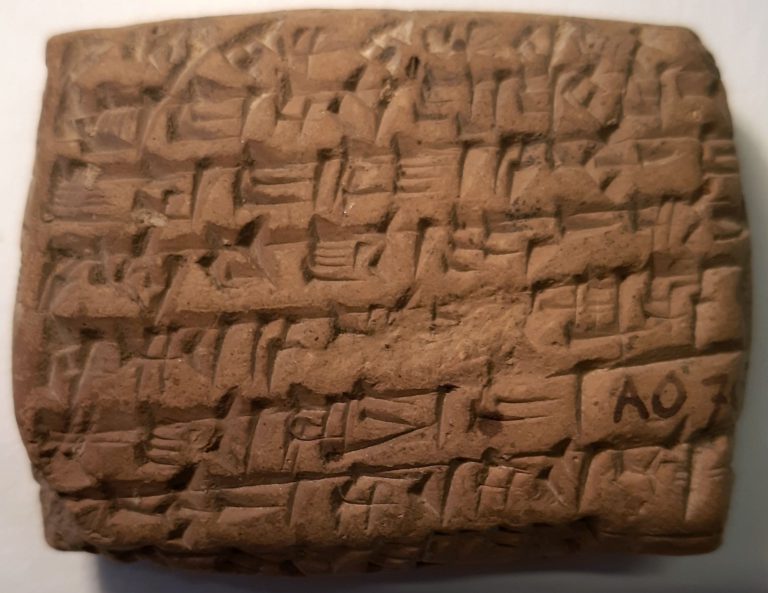Taram-Kubi, Assyrian housewife and businesswoman
31 October 2020
Taram-Kubi lived in Assur (not far from Mosul in Iraq) in the first half of the 19th century BCE. She was probably still young when she married Innaya, a merchant engaged in long-distance trade with Anatolia.
As with other Assyrian women, Taram-Kubi's life is known from the letters she sent to Kanesh (Kültepe, near Kayseri in Turkey) to her brother Imdi-ilum and her husband, which were discovered in the archives of their houses there.[1] The life of this Assyrian woman, both a businesswoman and a housewife, is told in a documentary film selected for several archaeological film festivals.[2]
Innaya had set up a pied-à-terre in Kanesh where he sold the goods – pewter and cloth – brought from Assur, or shipped them to other Assyrian trading posts on the Anatolian plateau. He brought back gold and silver, or sent it back to Assur. His records show that he was active for about twenty years in Kanesh and travelled from time to time to Assur to visit his wife and conduct certain transactions.
As the sole head of her household, Taram-Kubi sent news of the house and children to her husband. She gave birth to five boys who left home one after the other to participate in their father's trading business, transporting goods between Assur and Kanesh. The boys gradually settled in Anatolia in various trading posts where they acted as agents for their father. They regularly visited their mother in Assur and helped her with some of the business there. The couple also had daughters who at one time helped their mother weave fabrics for export to Anatolia, but then married and left their mother’s home.
Taram-Kubi found her situation difficult at times. She wrote vehement letters to her husband, complaining that he had taken everything away, that she lived in an empty house and had no money to buy food: "You told me that you left bracelets and rings that I could sell to buy food. (...) But I couldn't find them. When you left, you left me not a single sicle, you cleared out the house and emptied everything. Now, since you left, there has been a terrible famine in Assur, and you have left me not even a litre of barley. Yet I need to buy barley to feed us (...) But of what extravagance are you accusing me? There is absolutely nothing for our food, and you think we could be splurging! I gathered everything I could and sent it to you. Now I live in an empty house. It's time to buy grain. Send me the money from the sale of my cloths so that I can buy ten measures of barley.” Denying her husband's accusations about her supposedly luxurious tastes, she nevertheless asked him for more slaves and wanted to enlarge her house by buying that of her neighbour.

Some of the silver and gold she received was used for offerings to the gods. She was a devout woman who readily reminded her husband of his religious duties. With her sister Shimat-Assur, she also warned her brother Imdi-ilum: "You love money too much and despise your life!” He was devoted to making money and neglected his religious obligations, which worried his sisters.
Feeling increasingly lonely, Taram-Kubi regularly begged Innaya to come home and presented herself as the perfect wife who prepared beer for him: “The season is here. Bring me money so that we can get grain for you before you arrive. The beer bread I prepared for you has gone rancid (from waiting for you ...). When you have read this letter, come, look to Assur, your God, your home, and while I live that I may see you in person! However, her request was not granted. After being placed under house arrest for tax evasion, Innaya died in Kanesh, before he had time to retire and return to live with his wife as some of his colleagues had done.
The archives discovered in the houses of the Assyrian merchants at the Kültepe site provide an exceptional illustration of the daily life of the women and their families who lived four thousand years ago in Assur and Kanesh.
[1]C. Michel, Women of Aššur and Kaneš: Texts from the Archives of Assyrian Merchants, Writings from the Ancient World 42, SBL, Baltimore, 2020, xxx+570 p. cited texts, n° 128-.
[2] Ainsi parle Tarām-Kūbi, Correspondances assyriennes. A film by Cécile MICHEL and Vanessa TUBIANA-BRUN, CNRS - MSH Mondes (USR 3225), 46 min 30, video 16/9, stereo, France, 2020.


